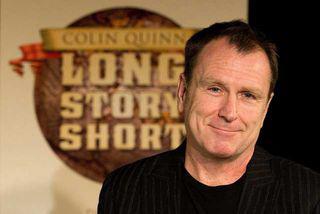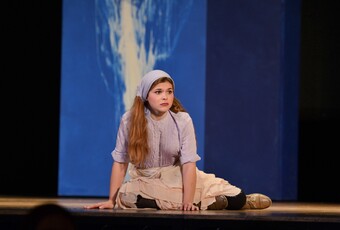Producing Solo Shows
A Cast of One but a Company of Many
What makes solo theatre unique? How might artists approach and create a solo play? And how might we get audiences to embrace this form? In this series on solo theatre, Scott Wesley Slavin asked six highly accomplished solo theatre practitioners to share their wisdom from working around the world on one-person shows.
I spent most of my childhood performing in plays and musicals, but I’m pretty sure I suffered from stage fright throughout this entire period. I even have a distinct memory of coming on stage as the lead character in Really Rosie at age twelve, and being so dumbstruck by the audience that I started scatting the words to the title song instead of singing the actual words. Luckily, I knew how to scat.
When I began working as a producer in the professional theatre over eight years ago, I knew I was doing the job I was always meant to do. The thought of gracing the stage again—unless it was to collect a small trophy—was not for me. I was filled with awe and respect for those that could do it seamlessly, and it was that feeling of admiration for these charismatic and talented artists that eventually led me to fall in love with solo performers. To me, the solo performer is the bravest, most compelling performer out there. When a solo performance is successful, it is a theatrical experience like no other.
I was initially drawn to the form of solo performance not because I knew much of anything about the art form itself, but because of my deep admiration and respect for the individual performers pursuing these shows. My litmus test in choosing the shows I produce is as follows: 1) Do I want to see it? 2) Does my mother want to see it? 3) Could I watch this show from the back of the house over, and over, and over…and over again? If the answer is yes to all three, I tend to sign on the dotted line.
As a commercial producer, my mind goes to the always baffling and often unanswerable questions of “Will this show sell tickets?” and “Who is the audience?” When I realized the first solo show I was involved with—Carrie Fisher’s Wishful Drinking—could actually answer those questions, I knew it was something I could successfully produce. Thus, my love for solo shows began.
Being the producer of a solo show is a unique position. Often the solo performer is also the writer, and often the show is autobiographical or distinctly topical to that individual’s expertise or personality. With the solo artist wearing so many hats, the lines between playwright, actor, and underlying rights holder are often blurred. In turn, a massive responsibility is placed on the producer to be as transparent and inclusive on nearly all matters that otherwise wouldn't be relevant on a regular play.
A year later, I met comedian Colin Quinn. Colin had been thinking about the history of the world told in seventy-five minutes. His touring stand-up act had included material about this topic for years, but he hadn’t fully formed it into a cohesive full-length presentation. It’s this critical moment in a solo show’s development that can benefit most from collaboration with a creative producer. It is this moment that I most love because it's the moment where you need to solve the following questions: Can this material stand on its own as a Broadway show? What does the Broadway version of this show look like? Is this show right for a Broadway audience? Colin had a fervent and local fan base in New York City but he wasn’t known as well to the target Broadway audience of women over forty-five, from the Upper West Side or tri-state area suburbs. It didn't matter. Colin’s brand of observational humor and deeply absorbing storytelling lead to the Drama Desk-nominated (and twice-extended) Colin Quinn Long Story Short, directed by his friend, the incomparable Jerry Seinfeld. Much of the typical Broadway audience that had previously eluded Colin were intrigued to see a show directed by Jerry Seinfeld, their comedic hero. And more often than not, those women had husbands who were already fans of Colin. As someone from our advertising team once said, “These women may be coming because of Jerry, but they are leaving in love with Colin.” And that was the truth.
Being the producer of a solo show is a unique position. Often the solo performer is also the writer, and often the show is autobiographical or distinctly topical to that individual’s expertise or personality. With the solo artist wearing so many hats, the lines between playwright, actor, and underlying rights holder are often blurred. In turn, a massive responsibility is placed on the producer to be as transparent and inclusive on nearly all matters that otherwise wouldn't be relevant on a regular play. This can be anything producerial from sharing and conferring on marketing materials, advertising strategy, performance schedule, show length, ticket pricing, reviews, and more. The layers that generally exist between a cast and their producer are simply not present on a solo show. It’s open season, with no holds barred. Everyone better play nicely, or it can be a very challenging experience.
It’s not enough for the producer to rely only on the talent of the solo performer in guiding the show’s success. While the solo performer will always have the spotlight, a smart producer knows that having a strong director to shape the storytelling is essential. The director knows the strengths and weaknesses, the vulnerabilities and assets of the performer, therefore the director can guide the creative landscape of the solo performance while maintaining a job description that is one part visionary and one part therapist. By definition, solo performances are a cast of one. That performer is up on stage, night after night, alone and vulnerable with no co-star or understudy. This puts great pressure on the performer, but also on the director, to ensure the curtain rises every night. The solo performer must feel supported and invested in all aspects of the show—anything short of that, and the production is doomed from the start. There are many pressures and impossibilities in creating successful theatre, so everything must be in balance.
As I said earlier, a successful solo performance is a theatrical experience like no other. For theatre to succeed, it must transcend. An audience must be transported by the storytelling. There must be an emotional connection between the individuals in their seats and the individuals on the stage. Great solo performance does this best when an audience member and the performer feel as though they are the only two people in the room. I feel especially blessed at this moment. I am currently working on three solo shows simultaneously, all very different from one another, yet all perfect in achieving this connection: Hershey Felder as Irving Berlin, The Darrell Hammond Project, and Benjamin Scheuer’s The Lion. These three performers are indelible examples of the great talent I so admire and want to be around. They pass the litmus test and they emotionally ground me. Oh, and I’ve already checked—my mom definitely wants to see all three shows and has already ordered her tickets.












Comments
The article is just the start of the conversation—we want to know what you think about this subject, too! HowlRound is a space for knowledge-sharing, and we welcome spirited, thoughtful, and on-topic dialogue. Find our full comments policy here